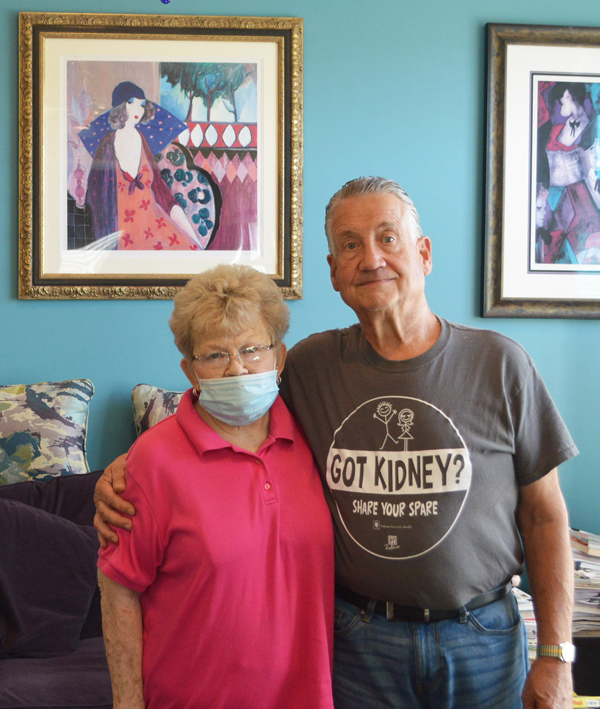
Janet Wagley has been a diabetic for approximately 30 years. She said she was taking mega doses of several medications for too long and those damaged her kidneys. For the past 10 years, her kidneys worsened.
She and her husband, John, started the process of looking for a kidney donation about two years ago. A few people showed interest in donating a kidney to Janet, but none of them worked out.
The way Janet was able to find a match was through a paired donor program.
“In it, if you find someone that’s willing to be a donor for you, you don’t have to match that person, you just have to be willing to donate a kidney,” John said.
John and Janet joined the paired donor program, with John willing to donate a kidney.
Originally, John was told he was too heavy to donate. He has since lost 65 pounds.
“I was too heavy, because, not directly my weight, but my blood pressure and my A1C needed” to be at a certain level, John said. The doctors had a formula that said he needed to lose 45 pounds in order to get to the A1C level. When he got to that weight, his A1C wasn’t good enough, “so they said try another 10 pounds and it still wasn’t good enough.”
John eventually lost 65 pounds and qualified to be a donor. He thinks he started the weight loss journey in March or April 2020, and by December, he was OK’d.
“Then they did a whole bunch of blood draws,” John said.
The doctors thought John might be a match for Janet.
“Even though we had a different blood type, it doesn’t have to be exactly the same blood type. Certain blood types, like she’s O positive and I’m an A negative. Part of the A negatives are matches for O positive, but I wasn’t a match,” John said.
That’s when the Wagleys were told about the paired donor program.
“Then each pair goes in the registry and they can come up with the same number of donors and recipients, then it could be maybe two pairs, maybe three pairs. It could be a lot of different pairs, so they all match up,” John said.
They way it worked with the paired donor program with the Wagleys was three pairs were involved – three donors and three recipients.
“It was February when we were on the OK list. We were on the paired donor list in February. Then about three weeks, there was a preliminary match, but it didn’t pan out. Somebody dropped out,” John said.
In early April, John said the Wagleys got word there were three matches. All the recipients and donors had to send their blood work in.
They were notified three weeks in advance that they having surgery on May 25.
John said he was a week away from being 71 when he had his surgery. He was one of three people at IU over 70 in the past 30 years to donate.
The Wagleys had their surgery in Indianapolis. Another pair of a donor and recipient had their surgeries at the University of Virginia in Charlottesville, Va., and the third pair were in Washington, D.C.
John’s kidney went to the recipient in Virginia. The Virginia kidney went to Washington, D.C., and the Washington, D.C., kidney came to Janet in Indiana, John said.
“It seems so strange to get so many people together that agree and it all works,” Janet said.
Janet said her original kidneys were not taken out, so she has three kidneys now. It will get to the point where the donated kidney will work.
The day after surgery, John said he was up and walking. Two days after surgery, he walked a mile.
Janet said, as far as recovery, her kidney was working fine. John said she went to physical therapy for three weeks after that. Janet said she had issues with the antirejection and antiviral medications. Janet was taken off some of the medications. Janet said she is fine now, as far as the medication issues, and is taking a less medication. She has already been taken off one more pill and will be taken off one more medication in about six months. Some medications that she is on, she will be on permanently.
Janet said she would rather swallow a pill than be on dialysis.
John said he’d sure recommend being a donor if a person can help someone out because it’s not much of an inconvenience for the donor.
“They treat you like a big hero, which you are. You feel like a real hero, so that’s good,” John said.
John said the paired program is a wonderful program because you don’t have to worry about matching with your loved one. He said, eventually, you’ll be able to save your loved one’s life, as well as someone else’s. You’re also opening up another cadaver kidney, which can go to someone else.
Janet said to make sure to sign up with a national registry when you’re signing up to donate. Some hospitals will say they can sign a person up, but it will be just for their hospital. John said a national registry is important because that registry goes nationwide.




